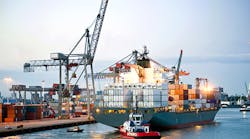Imagine a place where hundreds of millions of people struggle to survive on wages kept artificially low, where the basic resources of daily life like food and fuel are frequently scarce, and where the opportunities for self-improvement are limited by a government that reserves all civil, commercial, and individual rights to itself, to allocate when and how — and if — it chooses to do so.
There’s no need to imagine it. The place is China, a vast country of great resources but one that seeks stability and affluence, and global influence, by overworking its people and garnishing the wealth they create. This is the place that manufacturers all over the world consider a threat to their enterprises, fault for their poor revenues and weak order books, and demand along with Western governments that it adjust its currency in order to bring global economic stability.
Metalcasters are no different than the rest. When we conducted our annual 2011 Outlook Survey of metalcasting executives and managers we sought our respondents’ views on this among several subjects, and got a predictable number of responses blaming their circumstances on the competition from Chinese metalcasters:
“Greater competition from outsourcing to China,” is typical among dozens of curt responses. “We need border fees for importing to the U.S.,” … “China and India getting more market share” another wrote. “China — cheap castings” … “China increasingly a factor” … “Have lost business to China” … “Losing work to China” … “Lost some business to China; low cost, poorer quality.”
Undoubtedly Chinese castings have changed the global market, undercutting prices as a way to gain access to customers in the rest of the world. But, the costs for shipping castings are high and the quality of those products is highly unreliable: “Even though quality is ----, customers still buy from China, not realizing the true cost,” a respondent complained. In the terminology of our time, this is unsustainable, and numerous respondents confirm that point, too:
“Some customers who sourced castings to China are now coming back due to increased costs, higher inventory costs, quality and delivery problems,” one metalcaster confirmed. “We are seeing casting production that was made in China return to the U.S.,” another wrote. “We have been winning business that used to be made in India and China” … “Parts outsourced to China are beginning to come back.”
In short, there are obvious inefficiencies at both ends of this alleged market fraud, but none of us has much ability to see beyond our present crises. What is obvious is that over recent decades China has transformed itself so that it can manufacture and supply castings and innumerable other goods worldwide, but it will not sanction and cannot coordinate a domestic consumer market that will support those operations. After all its transformative efforts, China’s per capita GDP is just $3,400/year; the U.S. per capita GDP is $46,400/year. In castings and virtually every other category, Chinese suppliers must under price their products abroad because they cannot recover their costs at home.
What is more relevant about China’s role in the global market is that it has effectively exposed the weaknesses and inefficiencies everywhere. They have given buyers a reason and an opportunity to consider the real value of castings, and given metalcasters new incentive to examine their cost factors.
“New OSHA regulations are causing problems,” a foundryman explained to us. “The paperwork, etc., is unbelievable, especially for small businesses like us.” … “We need immediate action from Washington to reduce/eliminate the outrageous tax burden placed on our small businesses,” according to another. “Our casting prices will have to go up because of health insurance, unemployment insurance, raw materials cost, government-mandated paperwork, energy costs, and on and on and on,” said still another. Many more respondents tell us that employees’ medical and insurance costs, raw materials costs, and energy costs are the chief barriers to their prosperity.
In short, China’s undervalued exports are part of a long list of problems facing metalcasters here and in the rest of the world. But, China is also a useful — if pitiable — example of the inefficiencies that emerge in every market, and that grow unsustainable if consumer demand is not allowed to impose some rationale to the system. We don’t have to imagine what’s wrong about the Chinese system, but in this global economy we must not overlook our own inefficiencies.










